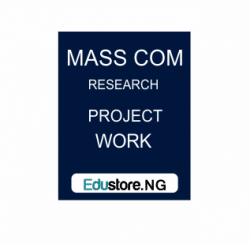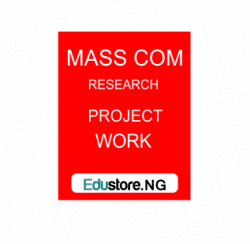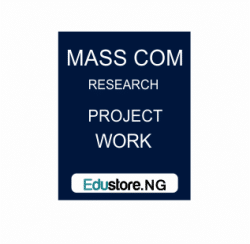CHAPTER ONE
INTRODUCTION
1.1 BACKGROUND TO THE STUDY
Radio is an essential mass medium that virtually every member of the society benefits from. Kuewumi (2009) asserts that Radio has radicalized the face of human communication and ultimately become a fixed point in the daily lives of humans whereby people are informed, taught, nurtured and reformed by way of relaxation, reinvigoration and resuscitation. This he argued, makes radio as a medium of mass communication being constantly sought after by its ardent listeners. Radio is the wireless transmission of signals through free space by electromagnetic radiation of a frequency significantly below that of visible light, in the radio frequency range, from about 30 kHz to 300GHz (Wikipedia, 2015).
Egbuchulam (2002) defined radio as a mobilizer and a formidable factor in the new world order in economy, technology and politics. Radio is best described as the cheapest, safest and the most effective medium of communication available to man. According to Onabajo (1999), in the developing world as in Asia and Africa, radio is cheap; it does not cost much compared to television which is expensive. It is also portable i.e. it can be easily transported from one place to another. It is credible as it transmits messages that its listeners hold important. Radio can also present news as it happens, brings the voices of news makers and artists into the homes of listeners. It also provides dramatic shows and other entertainment, which listeners can visualize even in the absence of visuals. For that reason, radio enjoys the advantage of simultaneity. It requires little effort of its consumers to comprehend its message. It is a good companion that entertains and informs its listeners.
Kuewumi (2009) asserted that imagine a world without radio; it will be like a garden without flowers and trees. Radio daily feeds us with information, teaches us and calms our nerves. If radio is well understood and its potentials realized, hardly will there be any one that will live without a radio. Many anxious moments will be healed.” Radio is a vehicle for projecting personality through which it attracts and holds an audience. It is an efficient instrument for getting a message to a large number of people at the same time, because it transcends the boundary of space and time, and also leaps across illiteracy barriers (Onabajo, 1999).
Egbuchulam (2002) asserts that radio has been a major communication tool for improving the quality of people’s lives, bringing to their doorstep news, entertainment and education through its programmes. Despite the world wide enchantment with the internet and web-based learning, radio still retains the advantage of being able to serve dispersed, isolated, and disadvantaged communities aspiring to overcome the barriers of illiteracy and physical distance in many countries. Listeners use and relate to radio in very different ways compared to other media. Listeners use radio for various reasons one of which is for emotional support, to keep their spirits up through programmes, and the result will determine to a large extent the attitude listeners would have to programmes. People listen to radio to be informed, entertained, educated, follow their favourite football team, and follow fashion trends or popular music, among others.
According to Oliveira, Portela, & Santos (2012), it is assumed that listeners make their own interpretations of a radio programme – if the presentation includes something they can relate to, something familiar. The encounter between the radio programme and the listener is regarded as a meaning making process within a cultural context.
This meaning making process is influenced by a variety of factors, such as the radio programme topic, design and the socio-cultural variations in experiences, knowledge and cultural dispositions. “The figures of those who listen to radio continue to increase thus indicating an increasing affinity for the free and participatory opportunities offered by radio stations” (Bamgboye, 2013). Radio plays an integral role in providing its listener with news, music and other programmes, while also acting as a voice that represents them as well as the society at large. It is therefore no argument that radio serves as a means of communication. In the aspect of information, radio provides information in terms of news that is, the day-to-day information within and outside the country. Radio also encourages its listener to know more about entertainment, education, and politics; they can also participate through phone-in programmes, talk shows and motivational programmes. Radio generally helps to broaden the knowledge intellectually and morally.
Federal University of Technology Minna Campus Radio popularly known as Search FM 92.3 is a campus radio located in Minna, and they poised themselves to have given the best of information on the latest events and stuffs happening around the world. The station is striving hard to give to the society the best in the world of radio broadcasting. Since her inception, Search FM 92.3 Campus Radio of Federal University of Technology, Minna has been able to reach the world and make positive impact on the students & staff of Federal University of Technology, Minna and also more greatly on the Community Host of Minna and its environs.
1.2 STATEMENT OF THE PROBLEM
The significance of radio in informing, educating, and entertaining students in the educational institution is not in doubt, and it is one way by which they keep in touch with the contemporary world. It can be assumed that before the advent of radio, information on what is happening outside the school premises especially in the educational and social world was (would be) difficult to discern by students. Even after the advent of radio and going a step further to establish campus radio stations, there is still doubt as to how many students are aware of what is happening beyond the walls of their school premises, and in the global world. As students, especially of higher institutions, it is imperative that they keep abreast of goings-on around them, in the country and the world at large. It is worthy to note that the residents in the states where campus radio stations are located also benefit by listening to radio station that is been moderated by youth and intellectuals whose energetic nature will offer the best in terms of news, entertainment, education and information. This study therefore seeks to examine the listenership level and perception of Federal University of technology Minna campus radio programs.
1.3 OBJECTIVES OF THE STUDY
The following are the objectives of this study:
1. To examine the listenership level and perception of Federal University of technology Minna campus radio programs
2. To determine factors affecting the listenership level of Federal University of technology Minna campus radio programs.
3. To examine the perception of the public on the quality of program aired on Federal University of technology Minna campus radio.
1.4 RESEARCH QUESTIONS
1. What is the listenership level and perception of Federal University of technology Minna campus radio programs?
2. What are the factors affecting the listenership level of Federal University of technology Minna campus radio programs?
3. What is the perception of the public on the quality of program aired on Federal University of technology Minna campus radio?
1.5 HYPOTHESIS
HO: There is no significant relationship between listenership level and perception of Federal University of technology Minna campus radio programs.
HA: There is significant relationship between listenership level and perception of Federal University of technology Minna campus radio programs.
1.6 SIGNIFICANCE OF THE STUDY
The following are the significance of this study:
1. The outcome of this study will educate the students, education administrators and the general public on the relationship between listenership level and perception of Federal University of technology Minna campus radio programs. It will also reveal the advantages of listening to campus radio stations.
2. This research will be a contribution to the body of literature in the area of the listenership level and perception of the public on campus radio station and its programs, thereby constituting the empirical literature for future research in the subject area.
1.7 SCOPE/LIMITATIONS OF THE STUDY
This study is limited to residents in Minna, Niger State where Federal University of technology Minna campus radio is located
DOWNLOAD COMPLETE WORK- For Reference Only: Materials are for research, citation, and idea generation purposes and not for submission as your original final year project work.
- Avoid Plagiarism: Do not copy or submit this content as your own project. Doing so may result in academic consequences.
- Use as a Framework: This complete project research material should guide the development of your own final year project work.
- Academic Access: This platform is designed to reduce the stress of visiting school libraries by providing easy access to research materials.
- Institutional Support: Tertiary institutions encourage the review of previous academic works such as journals and theses.
- Open Education: The site is maintained through paid subscriptions to continue offering open access educational resources.





